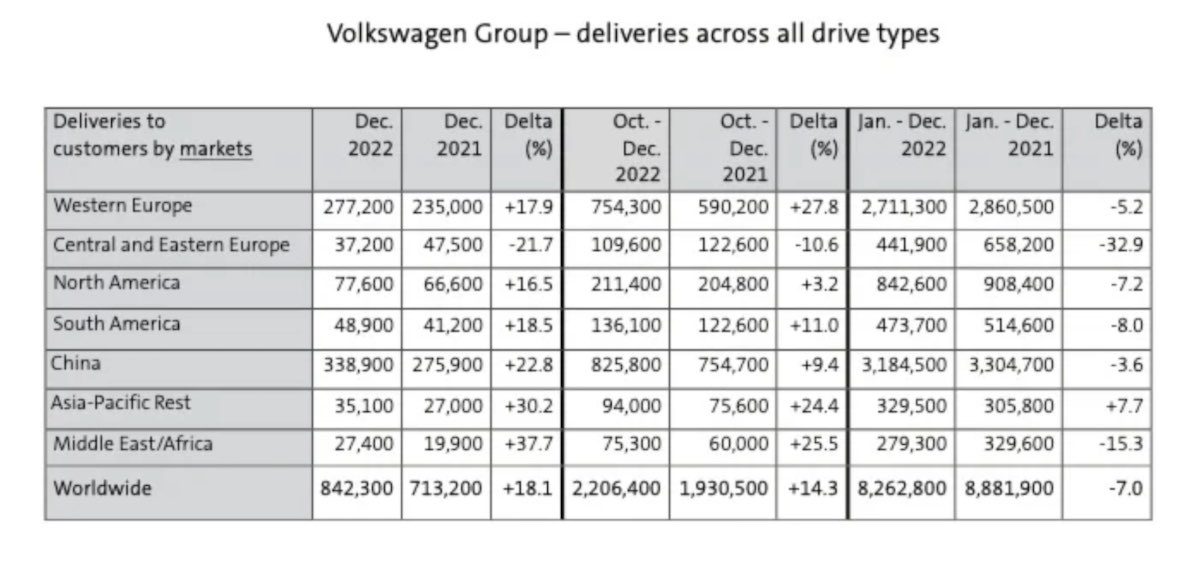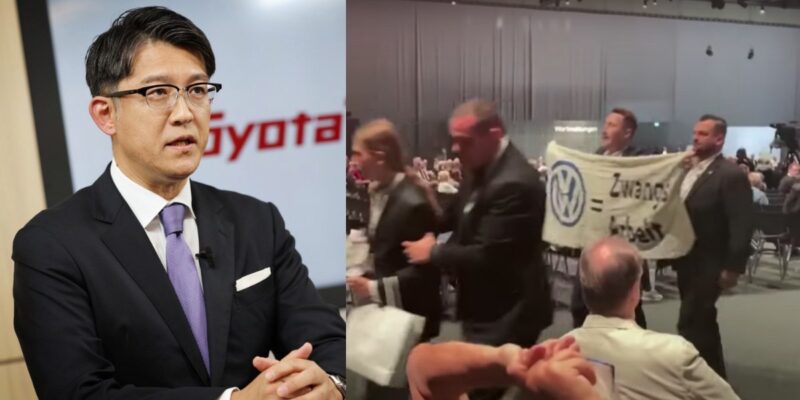The world’s two largest automakers have been accused of climate wrecking policies by protestors and their own shareholders, and have been urged to accelerate their transition away from fossil fuel vehicles and to provide more transparency around anti-EV lobbying.
On Wednesday, a group of three asset managers, who collectively hold $400 million of Toyota stock, submitted a shareholder proposal urging Toyota Motor Corp to improve disclosure of its lobbying on climate change. Reuters reports that it’s likely to be the first such proposal of its kind.
The shareholder group includes Danish pension fund AkademikerPension, Norway’s Storebrand Asset Management and Dutch pension investment company APG Asset Management. The group is calling on Toyota to commit to a comprehensive annual review of its climate-related lobbying.
In a statement, the group called for the report to detail whether Toyota’s lobbying, including lobbying through industry associations (like Australia’s FCAI), reduces risks for the company from climate change and aligns with the goals of the Paris Agreement as well as Toyota’s own 2050 carbon neutrality goal.
“We’re concerned that Toyota is missing out on profits from soaring EV sales, jeopardising its valuable brand and cementing its global laggard status,” said Anders Schelde, AkademikerPension’s chief investment officer.
“We need concrete policy changes and a better annual review drawing on independent data to calm international investors.”
On Wednesday, Toyota’s board recommended shareholders vote against the resolution which will be put to vote during the company’s annual general meeting in June.
Greenpeace Australia Pacific calls for an end to Toyota’s anti-EV lobbying
In a statement released following the shareholder proposal, Greenpeace Australia Pacific said it would support the move and called for Toyota to halt efforts to water down Australia’s fuel efficiency standards which the government is taking submissions on this month.
“Toyota’s own shareholders share our concerns that the carmaker is blocking progress on electric vehicles through its fossil fuel lobbying, despite clear demand from consumers for cleaner, more affordable electric vehicle options both at home and abroad,” Greenpeace Australia Pacific campaigner Joe Rafalowicz said today.
“Yet instead of embracing the shift, disappointingly, we’re seeing more of the same from Toyota executives who reportedly say they will block the proposal.
“It’s what we’ve come to expect from a carmaker that has become one of the world’s most aggressive anti-climate lobbyists.”
Greenpeace says Australia’s fuel efficiency standards will be a “true test” of Toyota’s climate commitments.
“There is a strong risk Toyota will use its established tactics to distract, weaken, and delay effective fuel efficiency standard legislation in Australia.”
Greenpeace is warning policymakers to be wary.
“Both at home and abroad, Toyota’s stubborn insistence on petrol-fuelled cars is holding consumers back from cleaner, more affordable transport,” it said.
“Toyota needs to realise that demand for electric vehicles is here and now. Instead, they are determined to put their petrol-fuelled profits ahead of Australian consumers and the planet.”
Greenpeace notes Toyota is the largest member of Australia’s auto lobby group, the Federal Chamber of Automotive Industries (FCAI) who’s “secret plan” to slow Australia’s EV transition was exposed by the Sydney Morning Herald in August 2022.
Greenpeace then published an extensive report into Toyota’s stalled climate efforts, which found the car manufacturer has been fighting against effective climate policy all over the world, including in Australia.
“When the Government moves to legislate fuel efficiency standards – likely later this year – we can expect that Toyota will be among those trying to stand in the way of progress. We urge all policy-makers to prioritise people and the planet ahead of Toyota’s profit motive,” said Rafalowicz.
Toyota shareholder proposal comes as protestors disrupt VW Group AGM
The shareholder call for lobbying transparency comes on the same day that the world’s second biggest automaker Volkswagon Group had its AGM interrupted by protestors.
Volkswagen Group CEO Oliver Blume’s speech was cut short on Wednesday when activists threw cake and accused VW of using forced labor in China as well as highlighting the companies slow move to electric vehicles.
Automotive News Europe reports that there were around 10 protestors at the AGM. One claimed VW is “making climate-damaging decisions”. A topless women had “Dirty Money” painted on her back and others held banners that read ‘End Uyghur Forced Labor.’
Investors also raised concerns over VW losing ground in China to EVs.
Automotive News Europe says activists including Haiyuer Kuerban of the World Uyhur Congress highlighted the reports of mass internment camps and links between VW suppliers and companies with a presence there, as well as the difficulty for locals to speak openly given the state’s restrictions on free speech.
“We do not see any evidence of human rights abuses at the plant.” said VW Group China chief Ralf Brandstaetter.
Brandstaetter visited the Xinjiang plant earlier this year and said on Wednesday: “I have no reason to doubt my impressions or the information available to me.”
“Volkswagen must be certain that its supply chains are clean,” said Ingo Speich, head of sustainability and corporate governance at Deka.
Volkswagon facing EV threat in its biggest market
According to Car Sales Statistics Volkswagen Group sold 8,262,800 in 2022. Of those, 3,184,500 were sold in China making up 39% of the company’s total global sales.

Of all the major car manufacturers, none is more dependent on the Chinese market than Volkswagen. China’s rapid shift to electric vehicles is threatening VW Group’s global sales as the world’s car largest market reached 35% EV market share in March 2023.
Technology analysts like Tony Seba predict the China could hit 50% EV market share by the end of this year.
While Chinese automakers and Tesla scale EV production into the millions, EV laggards Volkswagen and Toyota are seeing their global addressable market share disappear before their eyes.
It’s no wonder shareholders are joining climate campaigners calls for the auto giants to get with the program.

Daniel Bleakley is a clean technology researcher and advocate with a background in engineering and business. He has a strong interest in electric vehicles, renewable energy, manufacturing and public policy.

